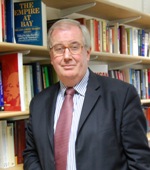Related Research Articles
Sir David Edgeworth Butler was an English political scientist who specialised in psephology, the study of elections. He has been described as "the father of modern election science".

Lawrence Goldman is an English historian and academic. He is the former director the Oxford Dictionary of National Biography and of the Institute of Historical Research, University of London. He has a PhD from the University of Cambridge.

Michael E. Cox is a British academic and international relations scholar. He is currently Emeritus Professor of International Relations at the London School of Economics (LSE) and Director of LSE IDEAS. He also teaches for the TRIUM Global Executive MBA Program, an alliance of NYU Stern and the London School of Economics and HEC School of Management.
Gerald Sandford Graham was Rhodes Professor of Imperial History at King's College London from 1949 until his retirement in 1970. He earned a world reputation for his series of in-depth studies of the interrelationship between sea power and the development of the British empire.

Julian Timothy Jackson is a British historian and academic. He is Professor of History at Queen Mary University of London, and is one of the leading authorities on twentieth-century France.
Gregory Claeys is Professor Emeritus of History at the University of London.
Eugenio F. Biagini is an Italian historian, specialising in democracy and liberalism in nineteenth- and twentieth-century Britain, Ireland and Italy, and is currently Professor in Modern British and European History at the University of Cambridge. He is best known for his work in free trade economics and ideology, the Italian risorgimento, Irish national identity, and the religious dimension of popular radicalism in the nineteenth century.
Timothy J. G. Harris is an historian of Later Stuart Britain.

Alison Caroline Bashford, is a historian specialising in global history and the history of science. She is Laureate Professor of History at the University of New South Wales and Director of the Laureate Centre for History & Population. Alison Bashford was previously Vere Harmsworth Professor of Imperial and Naval History at the University of Cambridge (2013–2017).
Jonathan Philip Parry, commonly referred to as Jon Parry, is professor of Modern British History at the University of Cambridge and Fellow of Pembroke College. He has specialised in 19th and 20th century British political and cultural history and has developed a later interest in the relationship between Britain and the Ottoman Empire.
Frank Trentmann is a professor of history in the Department of History, Classics and Archaeology at Birkbeck College, University of London. He is a specialist in the history of consumption.
Matthew J. Hilton, FRHistS, is an academic social historian. Since 2016, he has been Vice-Principal for Humanities and Social Sciences at Queen Mary University of London, where he holds a professorship.
Matthew Houlbrook, known professionally as Matt Houlbrook, is a British academic historian who is Professor of Cultural History at the University of Birmingham.
Margaret Candee Jacob is an American historian of science and Distinguished Professor of Research at UCLA. She specializes in the history of science, knowledge, the Enlightenment and Freemasonry.
Paul Andrew Readman, FRHistS, is a political and cultural historian. He is Professor in Modern British History at King's College London, where he was Head of the History Department (2008–12) and as of 2018 is Vice-Dean for Research.
Martin Francis is a British-American academic historian. He was Henry R. Winkler Professor of Modern History at the University of Cincinnati from 2003 to 2015, when he was appointed Professor of War and History at the University of Sussex.
Philippa Judith Amanda Levine, FRAI, FRHistS, is a historian of the British Empire, gender, race, science and technology. She has spent most of her career in the United States and has been Mary Helen Thompson Centennial Professor in the Humanities (2010–17) and Walter Prescott Webb Professor in History and Ideas at the University of Texas at Austin.
Jonathan Mark Lawrence, FRHistS is a British historian. Since 2019, he has been Professor of Modern British History at the University of Exeter.
Jose Ferial Harris, was a British historian and academic. She was Professor of Modern History at the University of Oxford from 1996 to 2008, and a fellow and tutor at St Catherine's College, Oxford, from 1978 to 1997.
Works about the United Kingdom and British Empire during the reign of Queen Victoria.
References
- 1 2 3 "Taylor, Prof. Miles", Who's Who 2017 (online edition), Oxford University Press, 2016. Retrieved 25 March 2017.
- 1 2 "Miles Taylor", University of York. Retrieved 26 March 2017.